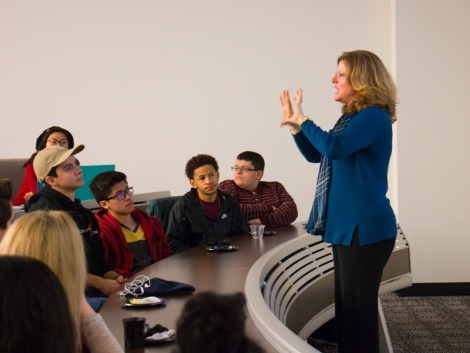In a talk sponsored by DePaul’s Department of Writing, Rhetoric, and Discourse, on Friday, February 10, Professor Victoria Gallagher of North Carolina State University described a rhetorical digital humanities project that she leads, which focuses on a speech given by the great American orator, Martin Luther King, Jr. This project is framed by an important question: What does it take to transform peoples’ hearts and minds about race?
About The Virtual MLK Project
Professor Gallagher described the Virtual MLK Project as situated at the intersection of rhetoric, Black history, and digital humanities. It is a project that has drawn faculty from rhetoric, media studies, and audio-visual production, and involves historical research, new-media production, and engagement with the local community. The project’s aim, said Gallagher, is to “craft a necessary space” for the recognition of historic public addresses that moved everyday people to action.
No recording exists of King’s “Fill Up the Jails” speech, and the White Rock Baptist Church where King delivered it has since been demolished. To recover the speech as an example of oratory, the Virtual MLK project has evolved over three phases. First, King’s speech was re-enacted at the new White Rock Baptist Church by a trained voice actor. Second, the speech was recorded from a number of different vantage points and compiled into an immersive audio experience, now available online. The third phase of the project is ongoing, and aims to create a virtual reality model of the speech as it was experienced by its audience in the space of the church in 1960.
Capturing Oral Rhetoric
Attendees of Gallagher’s talk listened to the audio recordings and saw some of the virtual reality prototypes: just this sampling of the full experience provided proof of the project’s influential message. It allows visitors to understand “public address as an experience,” and not just as a written speech or a video recording.
Gallagher noted that “there is a kind of transience about public address,” and that experiencing the words of MLK in audio or virtual reality creates a different experience from reading a speech. She posed questions to the audience about their reactions to hearing the re-enactment of King’s speech—What did we notice about his voice? Where did we feel we were sitting in relation to him? As Gallagher suggested, hearing the cadence and depth of the speaker’s voice and the call-and-response between the audience and the speaker enabled both new experiential and new analytical responses to this historic speech.
Gallagher ended by emphasizing that both the written speech and the Virtual MLK Project provide different experiences, and that insight can be found in both forms. She showed responses written by people who had attended the speech re-enactment, which illustrated one of the project’s key points: immersing oneself into a historic experience can open hearts and minds to important issues that we still navigate today.
WRD’s Upcoming Speaker
Professor Gallagher was the second of three speakers in this year’s Writing and Rhetoric Across Borders series. Our first speaker was Professor Krista Ratcliffe of Purdue, who spoke on rhetorical listening. Stay tuned for information on our next speaker, who will be coming to campus in late April!
